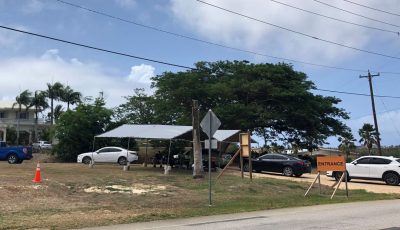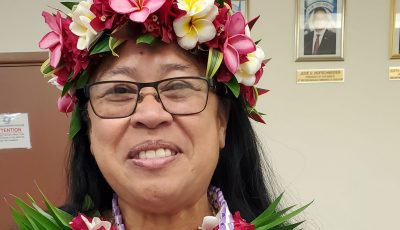Taking a NAP
News that might be of interest: ST editor goes under the scalpel today in Pea Eye for a bypass surgery. I am lighting a candle to flicker on the mystery of the moment.
Saipan Tribune gave me a ticket for two to a seafood dinner at one of the resort hotel’s restaurants. I brought a friend along who asked, “When was the last time you had a decent meal?” I must have acted overly eager. The place teemed with trim tourists. We were seated with locals, all exhibiting Micronesian girth.
At the NAP food stamps orientation in As Lito, a participant muttered to his wife, “Do we have to be here?” They might be reinstating their food stamp privileges received in Guam (my guess), finding themselves in dire need of assistance on Saipan.
Taking a nap is one of those valued activities at 70, relished and protected like a priced possession. I needed to attend an NAP orientation to qualify for food assistance, which I now need. Unlike my co-applicants, however, I was not reluctant to be there; I viewed the public service as what governments provide to tide over those who have difficulties getting by. It did not surprise me to hear the orienter elucidate on common violations as some allegedly viewed the program like a religious charity work for which they come with reverence and obeisance in the assent but freely violate the rules in the detail.
Well, it turned out to be a first-come, first-served basis; who came to register first, got the head call. Our host was a Micronesian who related to Filipinos enough to picked up phrases of the language, not a difficult thing to learn since his tongue also belonged to the IndoMalay AustroPolynesian family of languages with more than 40 percent Hispanic absorbed creole. We understood each other.
He tried to be funny, in a pedantic patriarchal way. He said that those in the audience were “privileged to receive the service”; he was willing to help in a helpful demeanor.
I did not see anyone carrying a U.S. passport so I might have been the only blatant citizen in the crowd (my guess). Most were from the Philippines, the Carolines, Micronesian nationals with many reinstating privilege, one with a very Islamic name, presumably, from South Asia. Many were pregnant, most reviving previous registrations. I certainly stood out in the crowd since I was the only one with a laptop, an Apple one at that!
I had to execute an Affidavit of Basic Needs so I stopped by a lawyer friend; I was not familiar with the format, and it thought it needed to be notarized. It did not, by my lawyer’s opinion, which meant that I could have hacked the one-page affidavit myself but I appreciated the precision of the lawyer’s language.
My appointment after my initial Monday visit was Wednesday with a specific time, and I thought that was quick until I got to NAP and discovered the same Monday crowd there ahead of me. It appears that the first-come, first-served principle applied still.
My appointment at NAP was at 8:30am, as everyone’s else. An officer called me an hour later, which was a decent interval, save there was the question of notary seal on the affidavit (my lawyer friend was more casual), and a copy of my last bank statement, items not indicated in the list of documents I was to bring. Obviously, I was not the only one that needed a notary public as NAP employs its own to notarize signatures.
I bank online paperless so I printed my bank activity from the Internet. The NAP officer took one look at the balance, then handed me a piece of paper that indicated that I could pick up my food stamps Friday, today. Considering the bulk of documents folks lugged around, heard interviews that focused on the recipients not abusing the service, it helped that my assigned social worker read the newspaper and recognized my face. Also, they may rarely see a “professional” show up on their door. It was obvious that the religious audience including our Moslem approached the service like it was charity rather than a public service.
That I was caught helplessly NAP-ping, I concede. The experience was fine for it allowed me to see how we created an assistance system where folks grovel for what is their privilege and right. The Commonwealth might market its part as a privilege, but the federal law makes the food stamps a right for those in need.
We are an island whose governance comes from the “goodwill” of head honchos, the Chamorri vs. the atcha’ot and manachang of an earlier era. Pinas in the audience grovel as badly as the others, given the similarity of their history under Spain, Britain/Germany, Japan, and the U.S.
One of my Chinese students in Liaoning’s SAU from south of Ningbo in Zhejiang said that she thought it was well I did not have to teach at one of the island schools so I can concentrate on promoting island tours merged to a language immersion program in my revitalized Earthbound Enterprises. True. And surviving meant taking a NAP.
We’ll leave Jayvee to his reflective time.



























